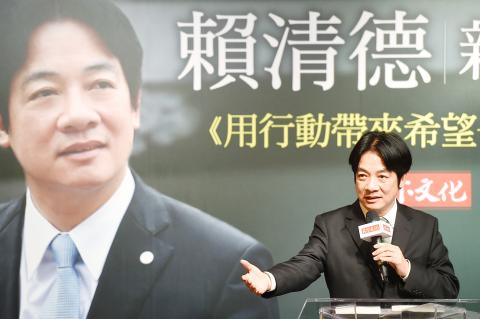The Democratic Progressive Party (DPP) needs to hold a fair, open and “paradigm-setting” presidential primary to regain the public’s trust, former premier and presidential hopeful William Lai (賴清德) said yesterday.
Lai made the remarks at a book launch in Taipei for his memoir Hope Through Action: The William Lai Style of Leadership (用行動帶來希望:賴清德的決策風格), which covers his second term as Tainan mayor and his term as premier.
Lai and President Tsai Ing-wen (蔡英文) last week separately registered for the party’s presidential primary.

Photo: Fang Pin-chao, Taipei Times
Until Lai’s announcement on Monday last week that he would run, which caught many party members off-guard, only Tsai had announced a bid for the party’s nomination.
DPP officials should not be pressured to take sides, the party organization should not mobilize to support one candidate over another, and factions should stay out of the contest, Lai said yesterday.
“The primary is a platform for candidates to talk about their ideals; only by holding a paradigm-setting primary will the DPP gain public support,” he said. “I would rather lose the primary than cause harm to President Tsai Ing-wen.”
Talking about the book, Lai said that he had asked Tsai for her position on several key issues before he agreed to become premier.
According to the book, Lai told Tsai that amendments to the Labor Standards Act (勞動基準法) were severely flawed and requested Tsai’s support for amending the law a second time, which he obtained.
The subject of granting a presidential pardon to former president Chen Shui-bian (陳水扁) was also brought up and Tsai said that she would work toward that goal.
Tsai also promised Lai that he would be able to maintain his pro-independence stance as the premier and that she was committed to pushing constitutional reforms through the Legislative Yuan, he wrote.
“These accounts … attempt to provide a historical record of our achievements and failures, the responsibilities of which must be shared collectively,” Lai said. “There was never any attempt on my part to harm the presidency or to oust Tsai. I will not respond to comments released to the media by a so-called high-ranking DPP official.”
The book was not written to boost his presidential campaign, he said, adding that work on the manuscript began in the third year of his second term as Tainan mayor.
After the DPP’s loses in the nine-in-one elections in November last year, Lai resigned as premier and then added the 500 days of his term as premier to the manuscript, he said.

MAKING WAVES: China’s maritime militia could become a nontraditional threat in war, clogging up shipping lanes to prevent US or Japanese intervention, a report said About 1,900 Chinese ships flying flags of convenience and fishing vessels that participated in China’s military exercises around Taiwan last month and in January last year have been listed for monitoring, Coast Guard Administration (CGA) Deputy Director-General Hsieh Ching-chin (謝慶欽) said yesterday. Following amendments to the Commercial Port Act (商港法) and the Law of Ships (船舶法) last month, the CGA can designate possible berthing areas or deny ports of call for vessels suspected of loitering around areas where undersea cables can be accessed, Oceans Affairs Council Minister Kuan Bi-ling (管碧玲) said. The list of suspected ships, originally 300, had risen to about

DAREDEVIL: Honnold said it had always been a dream of his to climb Taipei 101, while a Netflix producer said the skyscraper was ‘a real icon of this country’ US climber Alex Honnold yesterday took on Taiwan’s tallest building, becoming the first person to scale Taipei 101 without a rope, harness or safety net. Hundreds of spectators gathered at the base of the 101-story skyscraper to watch Honnold, 40, embark on his daredevil feat, which was also broadcast live on Netflix. Dressed in a red T-shirt and yellow custom-made climbing shoes, Honnold swiftly moved up the southeast face of the glass and steel building. At one point, he stepped onto a platform midway up to wave down at fans and onlookers who were taking photos. People watching from inside

Japan’s strategic alliance with the US would collapse if Tokyo were to turn away from a conflict in Taiwan, Japanese Prime Minister Sanae Takaichi said yesterday, but distanced herself from previous comments that suggested a possible military response in such an event. Takaichi expressed her latest views on a nationally broadcast TV program late on Monday, where an opposition party leader criticized her for igniting tensions with China with the earlier remarks. Ties between Japan and China have sunk to the worst level in years after Takaichi said in November that a hypothetical Chinese attack on Taiwan could bring about a Japanese

The WHO ignored early COVID-19 warnings from Taiwan, US Deputy Secretary of Health and Human Services Jim O’Neill said on Friday, as part of justification for Washington withdrawing from the global health body. US Secretary of State Marco Rubio on Thursday said that the US was pulling out of the UN agency, as it failed to fulfill its responsibilities during the COVID-19 pandemic. The WHO “ignored early COVID warnings from Taiwan in 2019 by pretending Taiwan did not exist, O’Neill wrote on X on Friday, Taiwan time. “It ignored rigorous science and promoted lockdowns.” The US will “continue international coordination on infectious